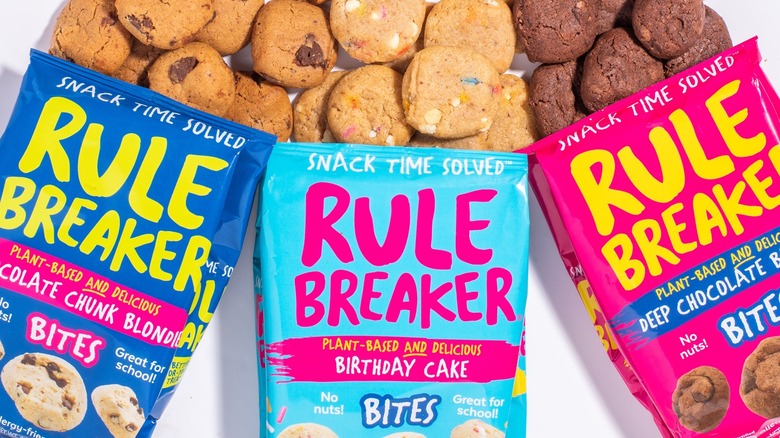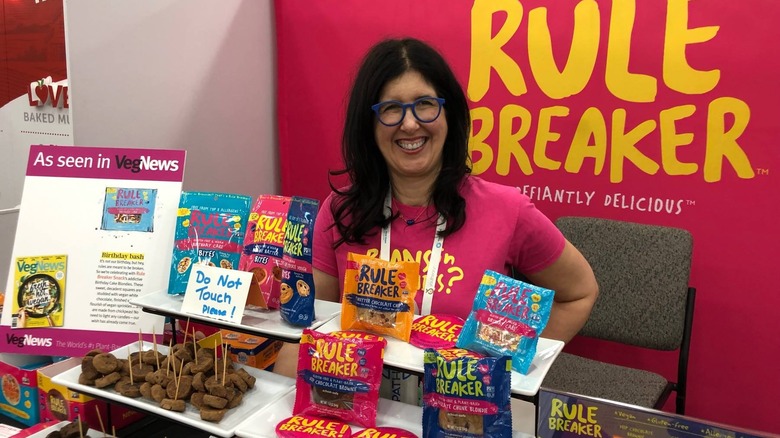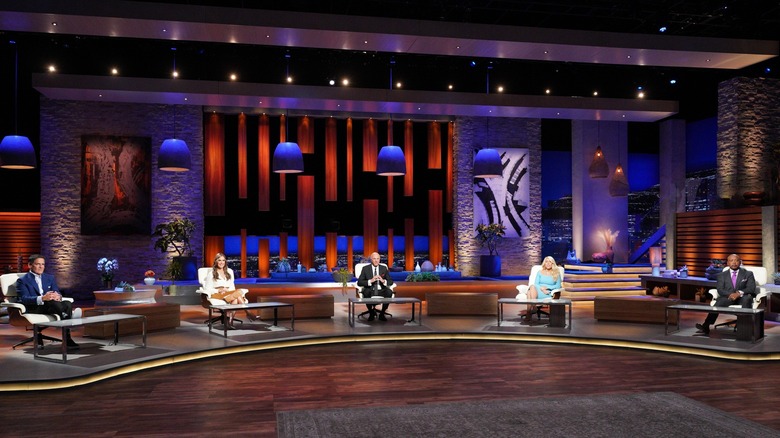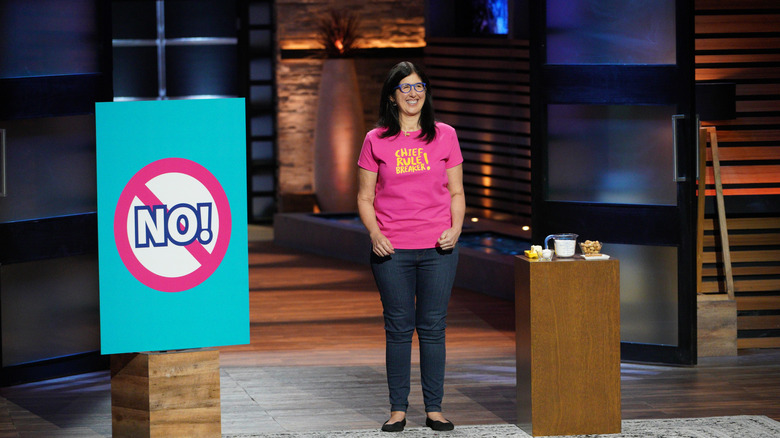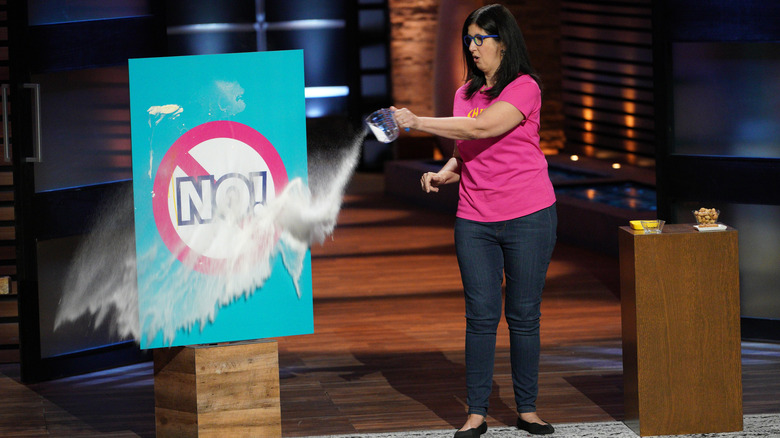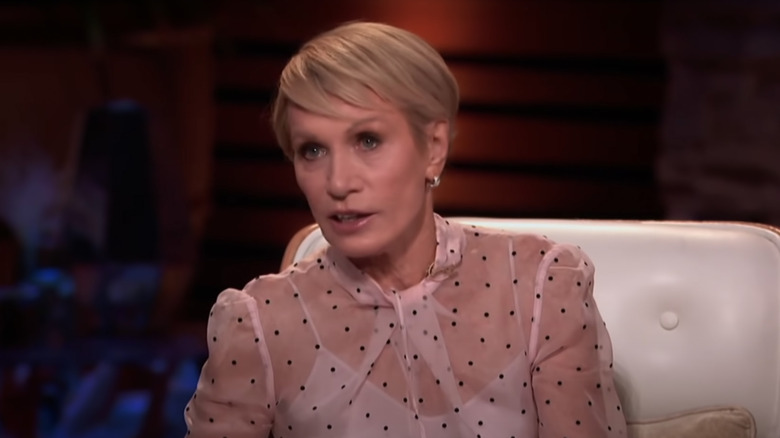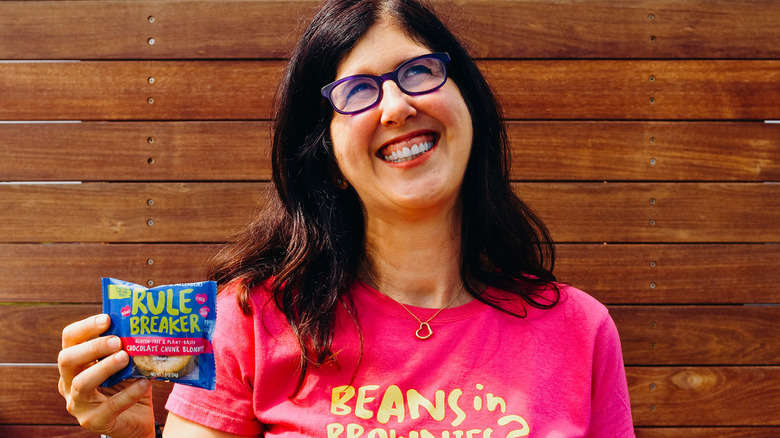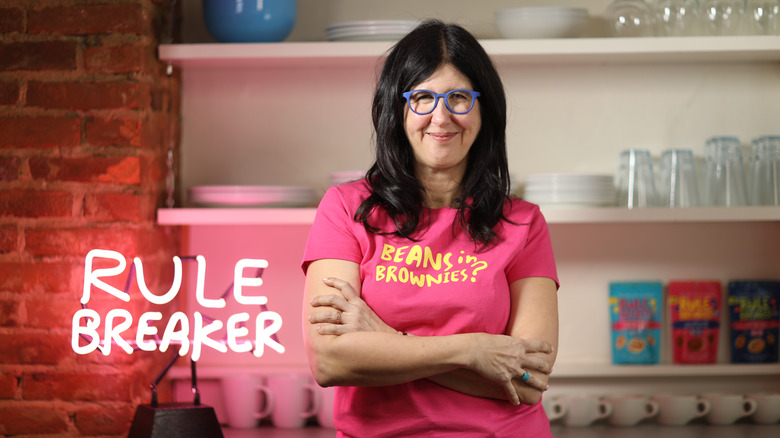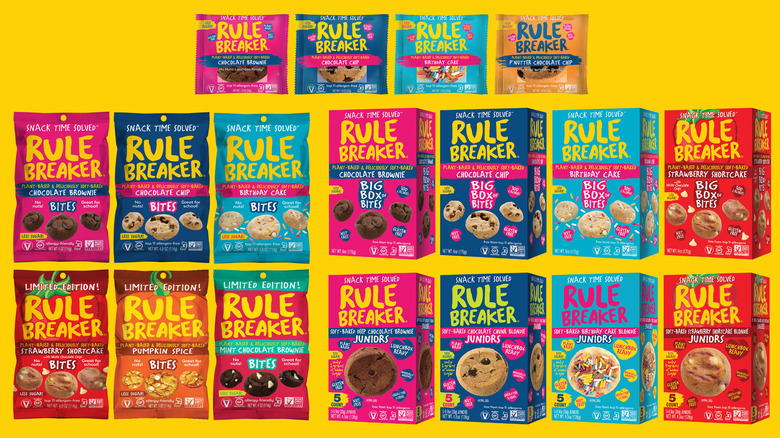Rule Breaker Snacks After Shark Tank: We Caught Up With The Founder
The path to scoring an appearance on "Shark Tank" is long and winding and doesn't always result in going home with the backing of a Shark. Still, even if the Sharks don't bite, a spot on the show can change the destiny of an entrepreneur.
Nancy Kalish, the Brooklyn-based founder of Rule Breaker Snacks, pitched her better-for-you, allergy-friendly sweets to the panel of "Shark Tank" investors in a show that aired during Season 12 in February 2021. Kalish founded the company in 2014, and while she had seen some modest success in sales, she was deeply in debt and was looking to take the next step with her brand that would help her finally break even. Her pitch: A 10 percent stake in the company for $400,000.
In her segment, Kalish charmed the judges with her upbeat personality and shocked them by hurling food onstage. While they liked the taste of Rule Breaker's cookies and brownies, the Sharks were ultimately spooked by the financial state of the company, and Kalish left the stage empty-handed.
More than two years after the episode debuted, Kalish spoke with Tasting Table about what it was like to film "Shark Tank" during the COVID-19 pandemic, what she learned from her time on the show, and how her company has fared since her time in front of the cameras.
A raging sweet tooth inspired Kalish to develop her first product
A former health journalist and cookbook editor, Kalish says she knew what she was supposed to eat to be healthy, but she also had an insatiable sweet tooth. She'd once worked as a cookbook editor and developed recipes as a restaurant consultant, so she got to work in the kitchen. Inspired by an Internet trend, she experimented with using beans to make brownies, but her first few incarnations were far from delicious. "No one wants a brownie that tastes like beans," she says. After what she thinks was at least 100 attempts, Kalish came up with a version that hit all her marks: it was chewy and moist, sweet enough to satisfy her sweet tooth, and, most importantly, didn't have a beany taste.
At the behest of friends and family, she decided to start her own company selling the treats in 2014. "I thought, 'How hard could it be to start a food company?'" she recalls. She booked a booth at an upcoming natural foods trade show and got to work.
The company's cookies and brownies list chickpeas as the first ingredient and are sweetened with dates. They come in a variety of flavors, including chocolate brownies, chocolate chip blondies, p'nutter chocolate chip blondies, and birthday cake blondies. The products are free of the 11 major allergens, including gluten, nuts, eggs, dairy, soy, and sesame.
Kalish has always been a Shark Tank fan
"I've always been a gigantic fan of 'Shark Tank,'" shares Kalish. "Since I don't have an MBA, I've learned a lot about business from watching those episodes." As soon as she felt like her company was on good footing, she decided she wanted to try for a spot on the show. An outgoing and confident person, Kalish had appeared on television and radio in her previous career as a journalist, so she felt comfortable in front of the camera.
As many previous "Shark Tank" contestants have revealed, it's a long process to get on the show. In discussing their "Shark Tank" appearance, the Fish Fixe founders spoke of the due diligence, multiple interviews, and lengthy preparation that it took to be offered a spot. Kalish found this to be the case as well. "The application was more lengthy than most college applications and just as detailed!" she says. "They vet you thoroughly with your financials, you sign scary contracts with them, [and submit a lot of] videos pitching to various levels of producers until you get to the end."
But she felt ready. Rule Breaker Snacks was gaining distribution in stores, and a Kickstarter campaign in mid-2019 had raised more than $28,000. The growing success of her company was enough to get her through the grueling audition process so she could get valuable advice on her company straight from the source.
Kalish's segment filmed in Vegas during the COVID-19 pandemic
While Kalish was thrilled to get a coveted invitation to be on "Shark Tank," she wasn't so thrilled that it was during the COVID-19 pandemic. Kalish says the producers had strict protocols in place to prevent a COVID outbreak on set, a situation that the Sienna Sauce founders also experienced during their turn on "Shark Tank." The set was being filmed at a hotel in Las Vegas, and contestants had to come to the city to quarantine in a hotel room for 10 days. The one advantage, Kalish says, is that she's heard that in previous seasons, there's no guarantee that you'd actually get to appear on the show, even if you were selected to be a contestant and even traveled to the filming location. During COVID, Kalish was of the understanding that since the producers were paying for the hotel stay, contestants were all but guaranteed that they'd be able to film their segment.
"By the time they let me out of my room, I was so excited to see another human being!" says Kalish. The quarantine policies also meant that Kalish didn't get the chance to interact and forge relationships with the other contestants, something that previous contestants she'd spoken with said was a highlight of being on the show.
What happened to Rule Breaker Snacks on Shark Tank?
Kalish says that when she walked out onto the set, she was surprised to see the Sharks, who normally sit together, were spread far apart in a giant semicircle. "It was impossible to keep everyone in your line of vision at the same time," she recalls. She felt like her head was turning back and forth as the Sharks shouted out questions, and she tried to respond. She was relieved when she watched the finished episode that this wasn't how it appeared onscreen.
Kalish impressed the Sharks with a story about how her first placement in Whole Foods nearly led to disaster. The distributor neglected to freeze her products, which at the time had only a three-week shelf life, and by the time they made it to the store shelves, they were spoiled. Kalish told the Sharks how she piled her inventory into her car and drove around to dozens of Whole Foods locations, replacing the spoiled products on the shelves with fresh ones. "That's called detailing," said Kevin O'Leary admiringly.
She was also relieved that when the Sharks tasted the products, they had a positive reaction. "They really liked the products for the most part, including Mr. Wonderful, who I was extremely worried about," says Kalish. And she had a right to be nervous, as apparently some of the Sharks had low expectations. "Wow!" exclaimed O'Leary. "I thought this would taste like sand."
Kalish debuted a now-trademark move during her Shark Tank appearance
On the show, Kalish surprised and amused the Sharks by hurling eggs, butter, sugar, and nuts at a sign emblazoned with the word "No!" as the Sharks gasped and grimaced. The move was meant to underscore the fact that Rule Breaker Snacks are free of these ingredients, which are typically present in brownies and blondies.
Kalish confides that she has terrible aim and practiced throwing the items in her hotel room during her quarantine — she'd even brought tarps from home to lay down in the room to prevent damage. Throwing the eggs and other ingredients at the sign "was the part I was the most nervous about," says Kalish. "I was negotiating with my producer to move the sign closer!" Luckily, all the ingredients hit their mark and seemed to create the memorable impact she was hoping for.
To this day, the ingredient-hurling move has become somewhat of a trademark for Kalish, who recreates it in investor presentations, promotional videos, and other appearances. "People definitely remember me," she says of the gimmick.
Why Rule Breaker Snacks didn't get a Shark Tank investor
Though most of the Sharks said they enjoyed the way Rule Breaker Snacks products tasted, not all of them were favorable. Daymond John said the peanut butter-flavored blondie (which Kalish says mimics the nutty flavor with sunflower butter and roasted chickpeas) tasted like a protein shake. "You don't want a partner who's not in love with the product," he said and was the first Shark to decline her pitch.
It was the company's financial health that deterred the others. John asked how much money she had put into the company, and when she revealed that she had invested $1.6 million of her own money, the Sharks unanimously reacted with shock. "That's a lotta cookies!" exclaimed Mark Cuban. They also learned she had a SBA loan and had borrowed $600,000 from her home equity line of credit.
One by one, the Sharks turned her down, citing her big debt. Barbara Corcoran admired Kalish's happy demeanor but added that her optimism is what got her into the debt in the first place, saying, "You're asking all of us to buy into a debt and not a business, and for that reason, I'm out." O'Leary, meanwhile, said bluntly, "This is uninvestible as it stands right now." Ultimately, none of the Sharks were willing to take what they saw as a risky investment.
What happened to Rule Breaker Snacks after Shark Tank
Nancy Kalish may not have found an investor on "Shark Tank," but she says Rule Breaker Snacks has benefited from the appearance. Beginning just seconds into the episode when it aired in February 2021, Kalish says she watched sales on Amazon pour in. "We did at least a month's worth of business that night, and it continued to go for the next few days and weeks, then it trickled down to retailers," she says. "Over the next few years, they've run the episode 10 to 15 times, and every time, we get an unexpected bump online."
Kalish has gotten funding from other sources since then. Shortly after she filmed the episode, she participated in a pitch slam, where she caught the interest of Bimbo Bakeries USA, owner of bakery brands like Sara Lee, Thomas, and Entenmann's. The company made a minority investment in Rule Breaker Snacks, which Kalish believes was the first investment by their United States venture group. The company also raised $171,000 on the Republic.com crowdfunding platform.
"I've gotten a lot of other angels, and I'll be raising money again soon," says Kalish. "Slowly but surely, I've been able to pay back the personal debt, but not all of it." According to an industry publication, Rule Breaker Snacks had sales of $1.3 million in the year "Shark Tank" aired, compared to $444,000 in sales in 2020. Kalish says that her company hit its sales goal of $2.2 million in 2022.
Kalish pays it forward to aspiring Shark Tank contestants
Before her time on "Shark Tank," Kalish reached out to former contestants she knew — and even some she didn't — to get their advice. Now, she pays the mitzvah forward and agrees to give the lowdown to anyone who reaches out to her as they prepare to appear on the show. One of her most important pieces of advice is to be prepared with in-stock inventory when the episode airs. "Not being able to ship those orders that you get, a lot of people will cancel their orders," she says.
She also passes along the advice she got that she found most valuable: The contestants are depicted as heroes or villains. The villains are testy with the Sharks, disagree, and come across as being unlikeable. Meanwhile, the hero seems like a good person who's trying hard, has a good product, and just wants to succeed. "No matter what they say to you, just keep smiling, and just answer calmly," she advises future contestants.
She was also told that whether or not a contestant got a deal didn't necessarily matter whether viewers bought the product — most important was whether the Sharks liked the product. This, in her case, turned out to be true.
What's Next for Rule Breaker Snacks
In recent years, Rule Breaker Snacks has added a bunch of new products, including its Juniors packaging, a box of five individually wrapped cookies perfect for lunchboxes. The product got them placement in 1,900 Kroger supermarkets, says Kalish. The company has also launched fun seasonal and limited-edition flavors, including pumpkin spice, gingerbread, and mint chocolate brownie, all using chickpea flour, which Kalish decided was one of the best gluten-free flours to use as a foundation for her treats. Using the flour instead of cooked chickpeas she used in her original recipe also helped increase the shelf life of the products.
Kalish reports that the company has a bunch of new products in development that will be available soon, including a morning bar with new seasonal flavors. She also hints that she's developing a version of a popular sweet baked good that has yet to be available in a plant-based or allergen-free option.
She also eventually sees Rule Breaker as getting into other product categories, such as salty snacks or frozen foods. And in the coming years, you may see Rule Breaker Snacks products in venues such as airports and airlines, hospitals, universities, and public schools.
"There's still a lot of runway and a lot of areas we haven't gotten into yet," says Kalish. It all goes to show that you don't necessarily need to have the protection of a Shark to be a big fish.
